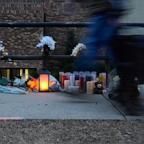Putin to grant Assad asylum in Russia
Russian President Vladimir Putin will grant political asylum to toppled Syrian President Bashar Assad, Kremlin spokesperson Dmitry Peskov told reporters on Monday.

"Of course, such decisions cannot be made without the head of state," Peskov said, as quoted by the Russian news agency Interfax. "This is his decision,"
"We have nothing to tell you about Mr. Assad's whereabouts right now," Peskov said, adding there was no official meeting between Putin and Assad planned.
-ABC News' Joe Simonetti




